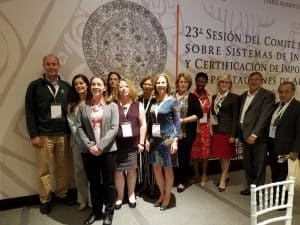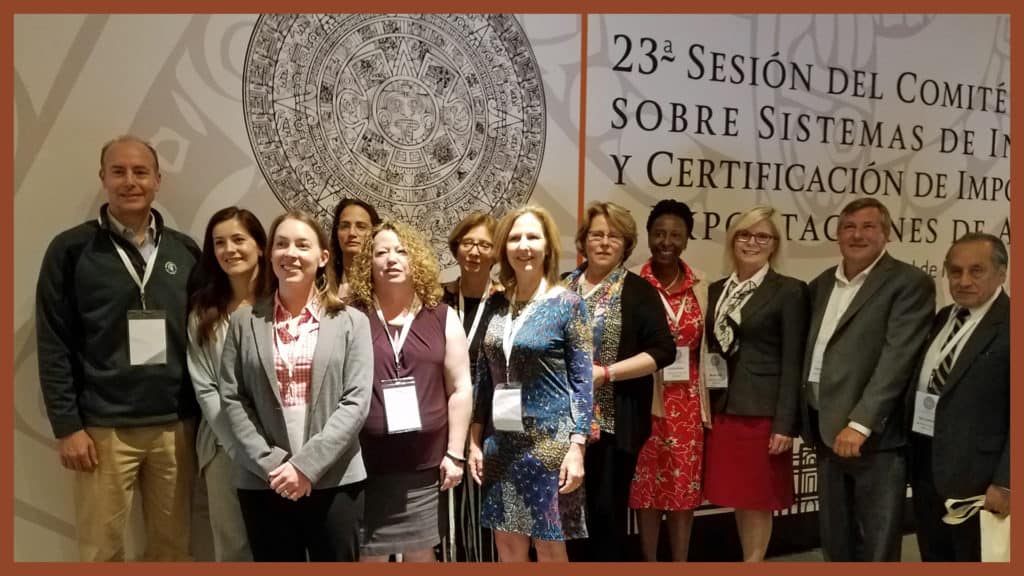Friday, May 5 Earlier today, Codex Alimentarius (CODEX, the world food code) took a major Food Fraud commitment by proposing an Electronic Working Group (EWG) to review other CODEX texts and to create a definition and scope for Food Fraud/ Food Integrity/ Food Authenticity/ related terms. The recommendations of CCFICS will be submitted upwards to the Codex Alimentarious Commission (CAC) for final approval. The Draft Discussion paper was widely supported at this conference during the formal open discussion by the member countries. Iran is leading the EWG with co-Chairs from Canada and the European Union. We were pleased to have attended the Codex Alimentarius Committee on Food Import and Export Inspection and Certification Systems (CCFICS) meeting as part of the US Delegation.

DISCLAIMER: Our comments represent our own opinions and do not necessarily represent the US Delegation or the official US position.
The first step of the EWG will be developing definitions. For example, what is Food Integrity? Food Authenticity? Food Fraud? What is an ‘adulterant’ and how is it different from a CODEX defined ‘contaminant’? Does Food Fraud only cover adulterant-substances? Is counterfeiting included? Is Food Fraud the same thing as Food Integrity or Food Authenticity? Is it only a CODEX matter if there is a there is a public health threat? Where else in CODEX are some aspects of Food Fraud covered? Is it completely covered? How much or how little? These are all unanswered questions.
The CCFICS -approved final report presents the direction for the Food Fraud EWG:
- Support and agreement to create an Electronic Working Group (EWG).
- Review CODEX definitions of similar or related terms such as contaminant, etc.
- Consider gap analysis of where Food Fraud is or isn’t covered in other parts of CODEX.
- Define Food Fraud/ Food Integrity/ Food Authenticity.
CODEX intentionally follows a very formal and methodical process since this essentially, and literally, will change the way forward for the world. Creating the EWG is a very formal activity for CODEX that will start the review of if – then how – Food Fraud will be incorporated into the formal Codex Alimentarius (world food code). If agreed to and it progresses forward, it will be a four to six year process until Food Fraud would be in the formal CODEX texts. Once a topic is fully implemented in CODEX it is widely adopted and becomes essentially a requirement for conducting business in many countries. CODEX is often the reference for food laws in many countries.
The Committee discussion was based on a Discussion Draft led by Iran and co-chaired by Canada and The Netherlands. That Discussion Paper included a working definition of Food Fraud (that will be reviewed by the EWG):
- “Food fraud, it is an emerging international issue that includes adulteration, deliberate and intentional substitution, dilution, simulation, tampering, counterfeiting, or misrepresentation of food, food ingredients, or food packaging; or false or misleading statements made about a product for economic gain.4” (Note 4: Citing the Elliott Review which cites Spink & Moyer, Journal of Food Science, 2011)
The CODEX EWG “Discussion Draft” authors specifically thanked four resources:
- “US Pharmacopeia and the (USP) Food Fraud Database” (USP is based in Rockville, Maryland, USA)
- “MSU and Dr. John Spink” (MSU is based in East Lansing, Michigan, USA; Dr. Spink attended the event as part of the US delegation)
- “The Food Fraud Network (FFN) administered by the European Commission (EC)”
- “The Elliott Review of Food Crime and Food Fraud” (UK, DEFRA led by Dr. Christopher Elliott, Queen’s University Belfast, Northern Ireland, UK)
Comments from the CCFICS Open Discussion:
- Australia
- “[Creating a definition] is an important first step to understand what we’re talking about.”
- “[The activity is useful] so that we’re clear on the definition of food fraud.”
- China
- Regarding usage of EMA and FF terms – the Discussion Draft flips back and forth… replace EMA with FF.”
- SSAFE (an NGO with Observer Status)
- “Does agree that it is a complex problem but should not dissuade CCFICS or Codex from addressing.”
- “We believe it is necessary because the authenticity of food is critical.”
- “SSAFE believes the scope will be determined on the definition of the terms that CCFICS [future work or project] provides.”
- “EMA is not exactly equivalent to FF.”
- European Union (EU)
- “This FF is of increasing importance and certainly an issue that we should not avoid discussing. It is certainly complex but it should not prevent CCFICS from working on it.”
- “We can agree on the proposed way forward. This is really the very first step. It is such a complex matter it cannot be solved in one action.”
- The Chair then concluded and stated:
- Start with defining FF/FI/FA/EMA –everything in that bucket – and then the EWG can reduce the scope if needed.
- This would create a foundation for CODEX and for global food regulation.
- This effort would help provide clarity for everyone.
- If we don’t address this properly now then we’ll continue to get more proposals because we’ve missed something.

From the CCFICS final report:
“Conclusion – “29.” “The Committee agreed to establish an [Electronic Working Group], chaired by the Islamic Republic of Iran and co-chaired by Canada and European Union, working in English only, with the following terms of reference:
“a.” clarify the definitions of food integrity, food authenticity, food fraud and [economically motivated adulteration] and delineate the scope for the preliminary assessment of CCFICS texts;
“b.” based on those definitions, undertake a preliminary assessment of existing CCFICS texts to identify possible gaps and the impact, whether positive or negative, of those texts in mitigating potential problems; and
“c.” prepare a discussion paper presenting the findings of that assessment and any need for potential new work.”
In many different forums, managed my many different stakeholders, there has been a debate about whether Food Fraud should be included in CODEX or other international Food Safety programs. The CCFICS committee and attendees clearly feel Food Fraud should be included. Comments from the final report include:
“22.” “Underscoring the complex implications of this area and the crosscutting nature of concerns involved, the Committee agreed that, while CCFICS undoubtedly had a role to play given the international trade-related implications, an integrated approach was required across all Codex.”
This is a significant point that emphasizes that efforts should be across CODEX and the response was not in individual commodity standards.
Later, “CCFICS may be better positioned to provide general higher-level guidance, it would be difficult for any single committee to address such diverse concerns through a single document, and measures should not be limited to fraud detection but also seek to achieve mitigation.”
This is an important statement since it recognizes the effort should be on interdisciplinary prevention and not just detection or analytical test methods.
The CODEX CCFICS next steps are aligned with our previous recommendations in the requirement for CODEX public comments. Our recommendations were consistent with the CCFICS conclusion: Food Fraud is now a ‘thing,’ so CODEX should address or at least provide a definition of ‘Food Fraud’ and ‘adulterant.’ The next step is to just develop a definition and scope and NOT yet the role of CODEX. (When considering the recommendations and the way forward, it is important to remember that the scope of CODEX is public health AND trade.) Throughout the discussions at this meeting there is growing consensus that Food Fraud is too big of a problem for CODEX to ignore. Engage through you country or trade organizations to continue to shape the direction of laws, regulations, standards, and certifications. Our food fraud prevention research team will remain engaged.
Reference:
- CODEX – Codex Alimentarius: …
- “The CODEX ALIMENTARIUS international food standards, guidelines and codes of practice contribute to the safety, quality and fairness of this international food trade. Consumers can trust the safety and quality of the food products they buy and importers can trust that the food they ordered will be in accordance with their specifications. … Codex members cover 99% of the world’s population. More and more developing countries are taking an active part in the Codex process – in many cases assisted by the Codex Trust Fund, which strives to finance – and train – participants from such countries to enable efficient participation. Being an active member of Codex helps countries to compete in sophisticated world markets – and to improve food safety for their own population. At the same time exporters know what importers demand, and importers are protected from substandard shipments. … Codex standards are based on the best available science assisted by independent international risk assessment bodies or ad-hoc consultations organized by FAO and WHO.”
- CCFICS – Codex Alimentarius Committee on Food Import and Export Inspection and Certification Systems: This “…was created to address a range of emerging issues related to exports, inspection, and certification. The main focus is “(a) to develop principles and guidelines for food import and export inspection and certification systems with a view to harmonizing methods and procedures which protect the health of consumers, ensure fair trading practices and facilitate international trade in foodstuffs;… .”
- Quality Assurance (CODEX CCFICS): “all those planned and systematic actions necessary to provide adequate confidence that a product or service will satisfy given requirements for quality (ISO-8402 Quality – Vocabulary).”
- Contaminant (CODEX, Procedural Manual, 22nd): unintentional excess substance that is common in the processing or manufacturing (Codex Alimentarius 2014).
- Food Security – the access to safe, continuous, nutritious, and economic supply of food (WHO 2009)

